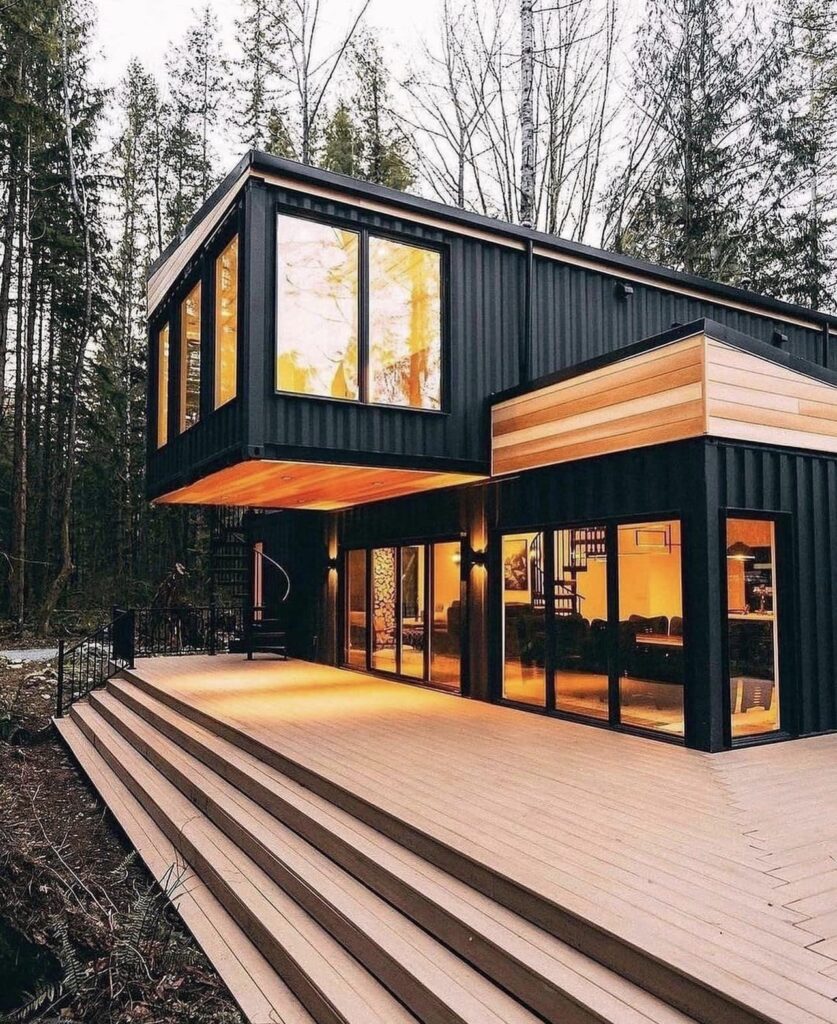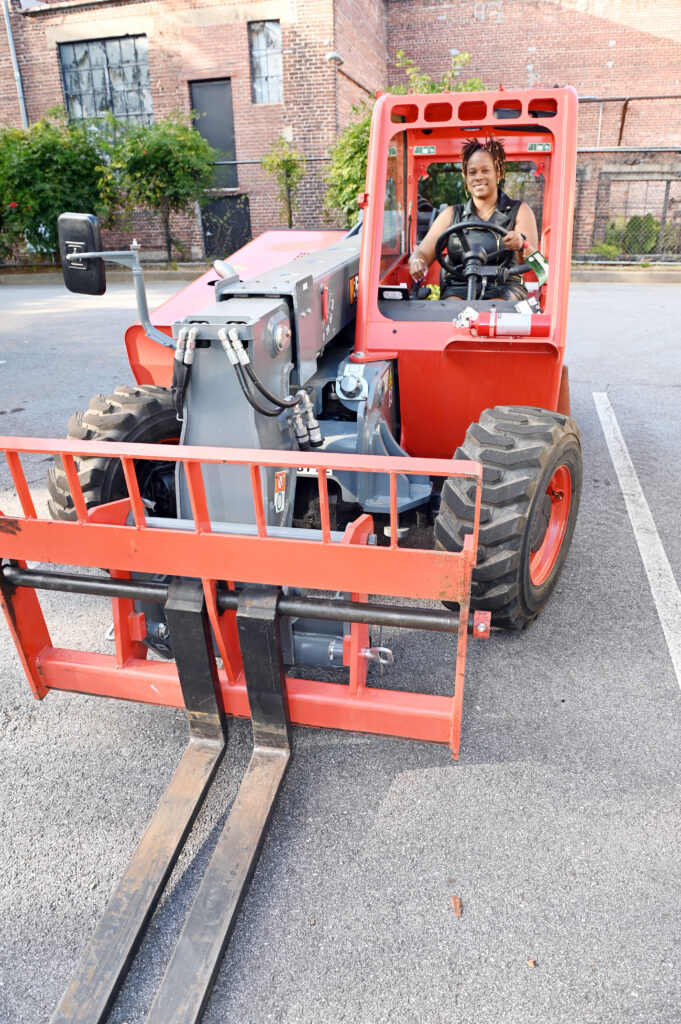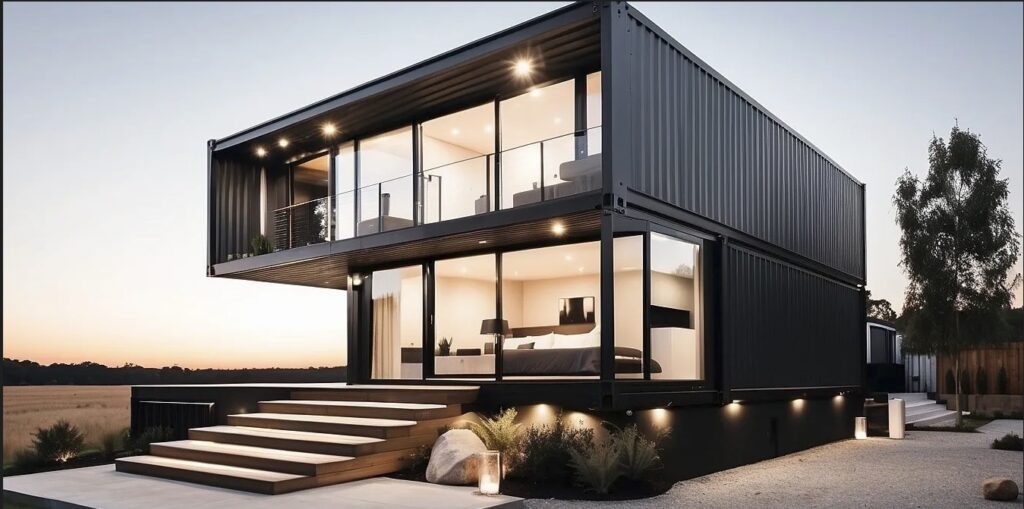 Jessica Lewis is an innovator in green construction as the Co-Founder of Mobu Enterprises, who is leading the way in making sustainable living attainable for creative buyers who are wanting to create a “greener” footprint when choosing the ideal structure for their homes and businesses. Let’s meet her…
Jessica Lewis is an innovator in green construction as the Co-Founder of Mobu Enterprises, who is leading the way in making sustainable living attainable for creative buyers who are wanting to create a “greener” footprint when choosing the ideal structure for their homes and businesses. Let’s meet her…
Define green construction, and what drew you to this industry when you co-founded Mobu Enterprises?
Green construction refers to a method that minimizes environmental impact while repurposing previously used materials, thereby preventing them from becoming waste. An example of this is our practice of transforming shipping containers, which typically serve a single purpose of transporting goods internationally, into new buildings instead of letting them become idle.
Where are you based, and do you provide services outside of the state in which you are based?
Currently, our base of operations spans across Atlanta, GA; Hancock, NY; Sheridan, WY; Las Vegas, NV; and Hagerstown, MD. We also have international offices in Ghana and Costa Rica, with upcoming expansions in Nigeria and Kenya. Overall, our services are available globally.
 Besides construction do you offer any other related services to the “buyer”?
Besides construction do you offer any other related services to the “buyer”?
We offer a range of services including construction consulting for individuals and businesses, architectural and engineering solutions, corporate Environmental, Social, and Governance (ESG) implementation, container-based vertical farming solutions, and real estate investment training and mentoring for both individuals and groups. Additionally, we provide domestic and international community and economic development strategy planning, non-profit setup with 501(c)(3) services, and asset protection through trust services.
Our most significant initiative is the launch of our community and economic development planning program. This program, primarily focused on contract and consumer law rights for the general public, offers one-on-one mentoring aimed at educating individuals about the intricacies of contract law. This knowledge can be crucial in achieving financial independence, as understanding contracts can aid in reducing debt and identifying contracts that are potentially illegal or voidable.
Can you share the average expense ranges for someone interested in converting a shipping container into their next home or business space? What other creative uses of these spaces are clients interested in?
The cost varies between $150 and $175 per square foot. Shipping containers usually measure between 120 to 320 square feet (about the area of a parking space). Opting for premium finishes like marble and luxurious gold fixtures typically pushes the price towards the upper limit of $175/square foot. However, many are unaware that high-end traditional materials that are environmentally friendly, such as granite, offer a similar aesthetic at a reduced cost.
Shipping containers have been creatively repurposed in numerous ways beyond their traditional use in transportation. Here are some innovative and practical applications:
- Homes and Offices: Shipping containers are increasingly being used to build affordable, modular homes and office spaces. They can be stacked and combined in various configurations to create unique, eco-friendly structures.
- Retail Spaces and Pop-up Shops: Their portability makes shipping containers ideal for temporary retail spaces, pop-up shops, and exhibition stands. They can easily be transported to different locations and customized to fit various retail needs.
- Restaurants and Cafes: Entrepreneurs are turning shipping containers into trendy restaurants, cafes, and bars. These establishments often have a modern, industrial aesthetic and can be in urban areas where traditional building space is scarce or expensive.
- Art Studios and Galleries: Artists and galleries are using shipping containers as creative spaces and exhibition areas, appreciating their modularity and the industrial feel they bring to the artistic environment.
- Community Centers and Schools: In some communities, shipping containers have been converted into affordable and functional spaces for education and community gatherings, especially in areas lacking traditional infrastructure.
- Emergency and Affordable Housing: Their quick deployability makes shipping containers an excellent choice for emergency housing in disaster-stricken areas. They are also being used to create affordable housing solutions in urban settings.
- Urban Farms and Greenhouses: With the rise of urban farming, shipping containers are being used as controlled environments for growing produce. They can be outfitted with hydroponic systems and LED lighting for efficient, year-round agriculture.
- Recreational Spaces: Innovative projects have transformed shipping containers into pools, saunas, and playgrounds, offering unique recreational solutions.
- Workshops and Storage: They are perfect for secure, weather-resistant workshops and storage units for tools, equipment, and inventory.
- Hotels and Hostels: Some entrepreneurs are building boutique hotels and hostels out of shipping containers, offering a unique lodging experience.
These versatile structures can be mobile and are valued for their durability, affordability, and ease of modification, making them suitable for a wide range of creative and practical applications.
 Sustainable living, tiny homes, buying land, creating farms and people living in their vehicles-on purpose- has slowly grown in favor with many when it comes to downsizing and living debt free? Who is your ideal client?
Sustainable living, tiny homes, buying land, creating farms and people living in their vehicles-on purpose- has slowly grown in favor with many when it comes to downsizing and living debt free? Who is your ideal client?
The ideal clients for shipping container homes include:
- Eco-conscious Individuals: People who are passionate about sustainability and reducing their environmental footprint often gravitate towards shipping container homes due to their use of recycled materials and potential for lower energy consumption.
- Budget-conscious Buyers: Those looking for affordable housing options find shipping container homes attractive. Their cost is typically lower than traditional construction, making them ideal for first-time homebuyers or those with a limited budget.
- Fans of Modern and Minimalist Design: Individuals who appreciate modern, industrial aesthetics and minimalist living are drawn to the unique style of container homes. These structures offer a distinct architectural look that stands out from conventional housing.
- DIY Enthusiasts and Custom Home Builders* Shipping container homes offer a level of customization and flexibility that appeals to DIY enthusiasts and those wanting to build their own unique living space.
- People Seeking Compact Living Spaces: Those interested in downsizing or living in a compact space find shipping container homes suitable due to their inherently smaller size and efficient use of space.
- Remote and Rural Homeowners: Individuals looking to build in remote or rural areas where traditional construction might be challenging or expensive can benefit from the portability and adaptability of shipping containers.
- Real Estate Investors: Investors seeking innovative properties for rental or resale may find shipping container homes a unique and profitable niche in the housing market.
- Community Developers and Non-profits: Organizations aiming to provide affordable, sustainable housing solutions for communities can utilize shipping container homes as a cost-effective alternative.
- In essence, shipping container homes cater to a diverse clientele, from those seeking affordable, eco-friendly living solutions to individuals and investors looking for a unique property with a modern twist.
Something to note: Our average size build is 2500sf, tiny homes and shipping containers are two different aspects of building. While you can build a shipping container to be small, tiny homes are defined by their ability to be movable. Our shipping containers, unless requested, are permanently affixed to a foundation, meaning non movable. Tiny homes are usually on wheels and are not classified as real estate, but instead as an RV, which means you cannot get the home appraised nor insured like your current home or apartment you nay live in. It’s considered an RV. This is a common misnomer that we thought it’s important for our viewers to understand.
 Tell us about your apprenticeship programs.
Tell us about your apprenticeship programs.
The MOBU Enterprises Foundation offers an apprenticeship program that focuses on green training. This program is part of their commitment to building community and enhancing skills through green trades and entrepreneurial training. For detailed information on the specifics of the apprenticeship, including the curriculum, duration, and application process, you can visit their website at [mobufoundation.org (https://mobufoundation.org/about-our-programs).
More specifically, MOBU Enterprises offers a comprehensive apprenticeship program through their foundation, focusing on training in green construction and entrepreneurship. Key aspects of this program include:
- Green Training Program: As a part of their commitment to sustainability, MOBU Enterprises provides training in green trades, equipping apprentices with the skills needed for eco-friendly construction practices.
- Focus on Women and Underrepresented Groups: The company aims to foster more female tradespeople, addressing the gender gap in fields like electrical and welding work. This initiative is especially significant in encouraging diversity and inclusivity in the construction industry.
- Partnership with Technical Schools: MOBU plans to collaborate with technical schools, enhancing the apprenticeship program’s reach and providing graduates with valuable qualifications, like an LLC, and possibly integrating them into their permanent team.
- Domestic and International Real Estate and Green Trades Training: The apprenticeship program is also linked to MOBU’s broader educational initiatives, such as a real estate development master class aimed at those interested in green trades. This aspect of the program educates participants on relationship building, finding green vendors, and sustainable building practices.
- Community and Economic Development: In line with their mission to build communities, MOBU’s apprenticeship program contributes to community development by providing training and job opportunities, especially for previously incarcerated individuals, immigrants, and Veterans. This approach helps in reacclimating these individuals into society and building vulnerable communities via green trades.
Past programming initiatives have also been geared towards creating sustainable, affordable housing solutions using disaster-resistant shipping containers, addressing the housing needs in various climates and environments. These homes are designed to be wind, water, and fireproof, offering a safe and sustainable living option.
In summary, MOBU Enterprises’ apprenticeship program is a multifaceted initiative that emphasizes green construction, inclusion, and community development, aligning with their overall mission of promoting sustainability and social responsibility in the construction industry.
Is there much competition yet in the industry or is it still an open playing field?
There are quite a few companies building with shipping containers, but in the green construction space there is a lot of room to grow due to county persons not understanding the build process, they think we are building with magic beans like Jack and the beanstalk, when in fact we are just building with steel verses wood (traditional). Most of our processes are the same via standard building code. If this basic understanding was acquired, you would see it more widespread. One thing I will say is, what is going to happen when there are no more trees? Most contractors will be out of business unless they pivot to green construction. If not now, it will be too late. They will be behind like the Internet, The Cordless phone, and now bitcoin bubbles. We are glad we are in the industry now.
What was your background before this?
My personal background was human services and insurance. I used to be in Human service working in prisons, detention, and drug rehabilitation centers. When I left that industry, I then went into being an insurance public adjuster and selling insurance policies for health and life.
Where can our readers connect with you online and also find out more information on Mobu? Readers can connect with us via our website at http://www.shippingliving.com. They can also find us on Instagram, YouTube and Facebook @shippingliving.
Any upcoming projects, events etc. that you would like to promote?
We are opening two Shipping container Building manufacturing plants, Quarter one of this year. One will be in a women’s prison in Alto, GA. Under the PIECP program and the other will be in Conyers GA. These will be Manufacturing facilities that will build Prefabricated buildings for residential and commercial use along with providing green trades training for local constituents. We are also opening several new international markets this year that will allow for American expats to be able to experience green living abroad under our “Green Luxe Experience”. By Mobu. We also have “Communities on Demand” where we will offer municipalities worldwide the opportunity to build on land that’s already readily available via our Master plan Community Based on the parcel size. The Community on Demand product Provides clean water, clean energy, multiple mixed-use spaces, green landscaping, and training to community members.
Where do you see Mobu in 10 years?
In 10 years, you will find our company having had manufacturing plants worldwide providing green trades training continually to all communities that desire to be more sustainable. We will also have the very first patented Shipping container vending machine that will provide automated Shipping containers units 24 hours a day. And lastly, we will be launching our digital community in the Metaverse. Having thriving, sustainable communities in the real world and digitally to remove the digital divide and provide equitable access to all who want to invest in real estate at all financial levels. We will offer our digital units/structures to the general public and offer the opportunity for them to visit the real-world property as the real- digital world investment opportunity and experience. Imagine a world where everyone can afford to buy real estate, how better off would we be.
